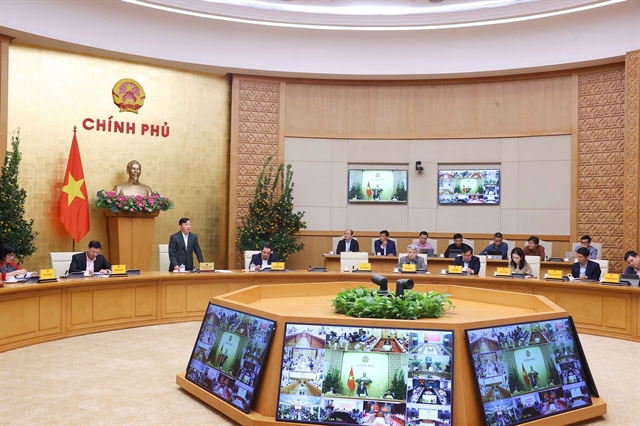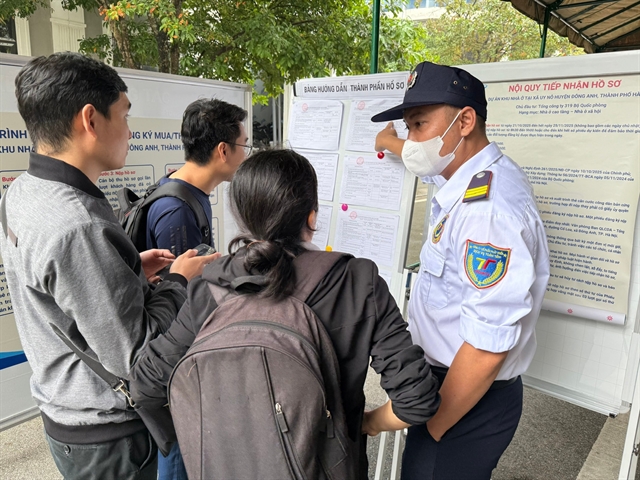 Society
Society

 |
| People look up information on buying low-income apartments. Photo tienphong.vn |
HÀ NỘI – Amid the storm of rising commercial housing prices, many low-income people are turning to social housing projects, but they are struggling with the procedures to obtain their dream homes due to the lottery system in place.
The journey of submitting documents, receiving a number, waiting for the lottery to call their numbers is a tiring and risky race.
Overnight lining-up
In very early morning, the social housing project area in Đông Anh Commune of Hà Nội, was crowded with people waiting in line.
They queued from 5am, bringing documents, hoping to get tickets to submit applications to buy apartments.
Phương Anh, 36, an office worker in Định Công Ward, visited two days in a row.
She told tienphong.vn: “The first two days, I queued from 9am until 4pm but it was still not my turn to submit my application.
“When I heard that the investor was distributing queue numbers, I took the morning off work and took the bus from my house for more than an hour, but as soon as I arrived, they announced that there were enough numbers for the whole afternoon.”
Not deterred, she came back earlier the next morning.
“According to people’s experiences, the numbers were issued from 8.30am but to make sure to get a ticket, I should be here at 5am,” she said.
“If I am lucky enough to get the ticket, I still need one more day to come back to submit the documents. It means it will take me a total four days,” she said.
Similarly, Ngọc Hà, 40, and Lê Hạnh, 35, who are workers at a garment company in Hoài Đức Commune, had to take a taxi to travel more than 20km to Đông Anh Commune early in the morning to register.
However, when they arrived, the staff informed them that all the queue numbers for the day had already been distributed. The two women sat quietly by the roadside, their eyes filled with regret.
Hà lives with her family of four in a rented 15-square-metre apartment. Her husband is working at a small mechanical workshop with unstable income.
“With our current income, we could not afford a commercial apartment. In the social housing project, we hoped to be lucky enough to buy the smallest apartment of about 40sq.m to escape from staying in a room forever,” Hà said.
Lieutenant Colonel Nguyễn Văn Dũng, deputy director of the Investment Project Management Board of Corporation 319 – the developer of the Đông Anh Social Housing Project, said that the process of receiving social housing project documents on the first day was organised quite orderly.
Dũng said at night, some brought blankets, mosquito nets, mats and pillows to sleep outside to save a spot, he said.
“In that situation, we set up tents and arranged enough seats for people as well as distributed food, drinking water and rented public toilets to serve the people,” said Dũng.
The social housing project of Rice City Long Châu in Bồ Đề Commune is expected to be a new step forward in innovating the way of receiving documents online, helping people no longer have to jostle and queue day and night.
However, online applications have also brought many issues for applicants because the network was often overloaded, slow to respond or even completely freezes, making it impossible for many people to complete the registration process.
Nguyễn Lê, a resident in Hà Nội, prepared documents for six months but the result was not as he expected.
“I waited since the first days of the portal opening but kept getting overloaded error messages. After more than one month, the end of the application deadline, the system still would not let me submit.
“How would the qualified applications that could not be submitted due to network congestion and technical errors be handled after the deadline? Who is responsible? Was there anything shady behind the continuous technical errors and network congestion?”
A transparent process is needed
Phạm Thị Miền, deputy director of the Việt Nam Real Estate Market Research and Evaluation Institute (VARS IRE), agreed that the demand for social housing was currently enormous, far exceeding actual supply.
Whether applications are accepted in person or online, systems would be quickly overloaded due to the rush for social housing.
Miền said: “In the context of continuously rising apartment prices in Hà Nội and new record highs being set, the ability of middle- and low-income earners to buy homes is shrinking.
"New supply remains far below the annual demand of about 100,000 units, making social housing the only hope and choice for tens of thousands of families seeking stable housing.
“Although the pace of social housing development has accelerated recently, the goal of completing one million social housing units by 2030 remains a huge challenge.
"As of now, it is almost certain that we will not achieve the target for phase one.”
According to Miền, several measures are needed to make the social housing market transparent and stable. These include making the application and screening process fully transparent; digitising and publicly disclosing the entire registration, review and lottery process online, allowing people to access registration lists, results and priority orders.
At the same time, strict supervision of social housing resales must be enforced, with heavy penalties for illegal transfers and withdrawal of benefits in case of violations.
Additionally, long-term solutions should focus on increasing the supply of affordable commercial housing to balance supply and demand. Otherwise, as property prices continue to rise, social housing will remain a solution that's prone to speculation and profiteering. VNS




